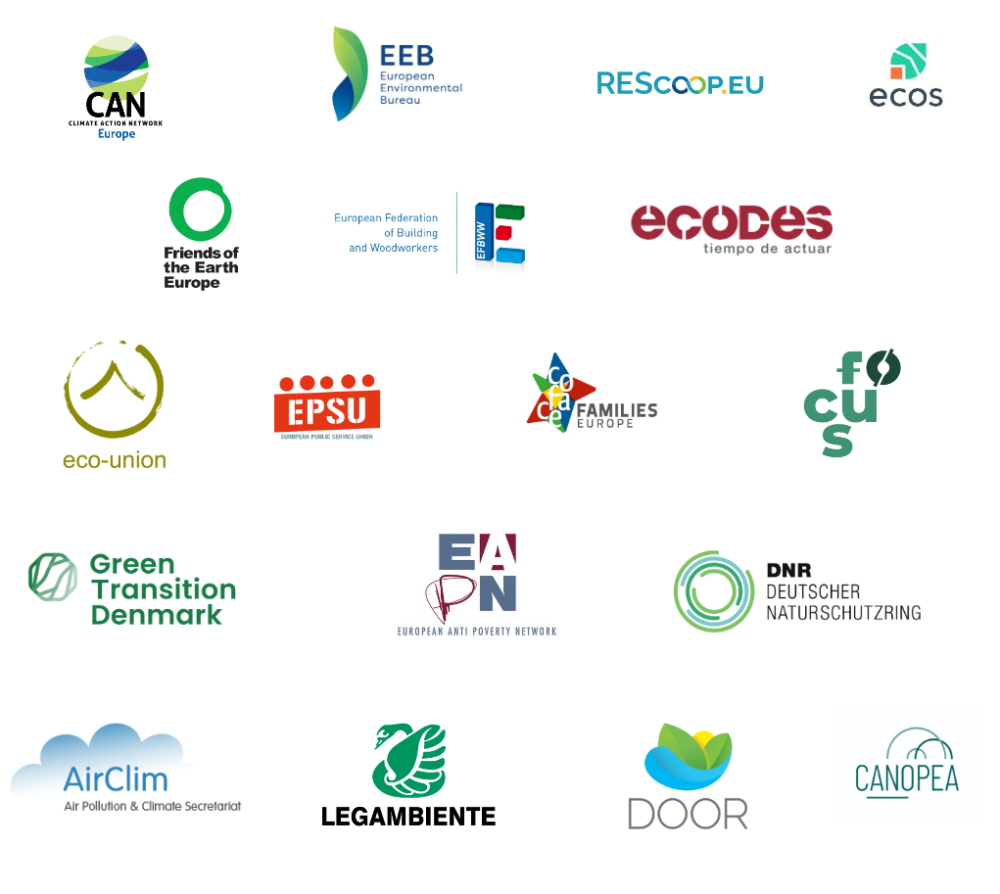18 prominent European NGOs has sent a letter to EU Policymakers ahead of the Final Energy Performance of Buildings Directive (EPBD) calling for ambitious National Building Renovation Plans. These plans can set a foundation that will see the worst-performing homes and buildings in member states being renovated, helping to reduce energy demand and alleviate energy poverty across the EU.
Dear Ambassador,
We are a group of non-governmental organisations representing civil society across Europe, and in view of the upcoming COREPER meeting on the 6th of December, we would like to share with you our recommendations as regards National Building Renovation Plans (NRBPs), stemming from the Energy Performance of Buildings Directive (EPBD) which is still under revision. These Plans are a crucial instrument for Member States to outline Paris-Agreement-compatible and socially just transition pathways towards climate neutrality for our built environment. They can also increase social acceptability of energy renovations via citizen engagements and ownerships of renovation projects and programmes. In view of the societal advantages and environmental benefits that the implementation of these Plans can unleash, we urge you to:
- STRENGTHEN THE FOCUS ON LEAKIEST BUILDINGS TO FIGHT ENERGY POVERTY: Over 42 million people in Europe cannot keep their homes adequately warm during the winter, while EU homes continue to be highly inefficient and rely on expensive, outdated and dirty fossil fuels for heating. NBRPs should keep a strong focus on better defining (via for instance using the same types of metrics and following a harmonised definition), targeting and decarbonising worst-performing buildings at national level. A dedicated decarbonisation pathway for this segment should be established with the view of eradicating energy poverty and fulfilling the EU energy and climate targets faster. To do so, we call on you to include as part of the roadmap, targets for the reduction of energy poverty rates, supported by clear data about the number of households in energy poverty and the barriers in governance structures and how to address them to ultimately fight this phenomenon. Reduction targets for energy poverty will have to be supported by the design of policies and measures (including social safeguards) and adequate, ring-fenced funding and technical support for vulnerable households and organisations that work with or represent them (i.e., social housing, local authorities, or citizen-led renovation projects.
2.REINFORCE DECARBONISATION REQUIREMENTS:
To ensure that the existing building stock and new constructions are decarbonised on time for the EU climate neutrality goal, National Building Renovation Plans will need to lay out clear requirements for Member States as regards decreasing whole-life cycle carbon emissions coming from buildings. On the side of operational carbon emissions, including a clear date for a complete phase out for fossil fuel use in buildings will be paramount to ensure the fulfilment of the Paris Agreement goals. According to the calculations of the Paris-Agreement Compatible (PAC) scenario, 2040 should be the latest deadline for a total phase out date, supported by deep renovations and the installation of only heating and cooling systems with the highest energy efficiency classes, which will need to be supported by a strong and ambitious revised Ecodesign Directive.
3. ENSURE OPEN AND INCLUSIVE CONSULTATION PROCESSES:
Last but not least, in order to ensure that the Renovation Wave and the transition of the built environment becomes a fully democratised and inclusive process, NBRPs will need to structurally establish, open and transparent consultations processes (including environmental/social non-profit organisations, energy communities, and other organisations representing or directly working with vulnerable citizens). This will ensure that renovation plans developed at different levels, especially at the local one, count on the support and active involvement of citizens.
We thank you for your attention and important work on this file. We standby for any clarifications that might be required.
Best regards,




